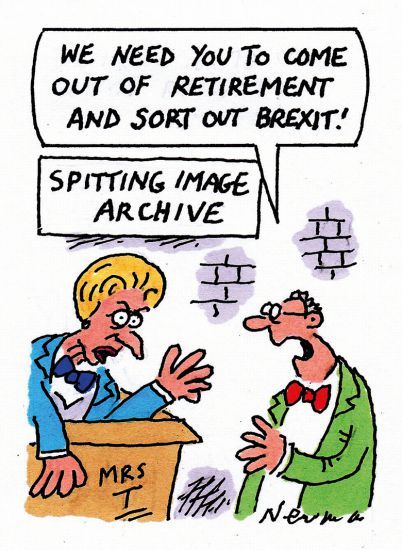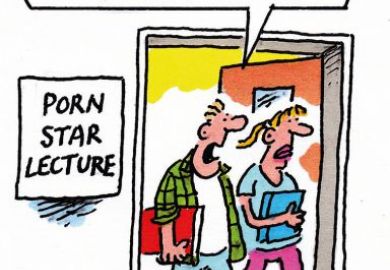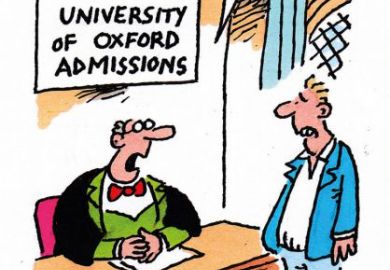
Twenty-two years after the political satire Spitting Image last appeared on UK television, its grotesque puppets have finally found a permanent home. The rubber moulds of Margaret Thatcher, Prince Charles and other 1980s establishment figures, as well as series scripts and recordings, have been donated by the show’s impresario, Roger Law, to the University of Cambridge’s library, which also holds the original work of Charles Darwin and the papers of Sir Isaac Newton, BBC News Online reported on 14 November. Mr Law, who studied at the Cambridge School of Art and began his association with co-creator Peter Fluck in the city, said that his archive was now “in the right place – it’s come home”.
Billionaire Michael Bloomberg’s $1.8 billion (£1.4 billion) donation to his alma mater, Johns Hopkins University, has fuelled speculation that the financial services tycoon will mount a presidential bid. The former New York mayor, who is worth more than $50 billion – described his gift to the Baltimore university as a guarantee that Hopkins could for ever graduate all its students debt-free. Too many US students face a financial blockade that limits their college choices, Mr Bloomberg said in a New York Times editorial on 18 November. The donation – a record for any US institution – has led many to wonder if the 76-year-old Democrat will run against Donald Trump in 2020. Establishing some impeccable credentials with graduates and the higher education community is not, however, a sure-fire vote winner. Indeed, Mr Trump reached the White House in 2016 despite having to defend claims that he had conned “Trump University” students out of millions of dollars.
Being John Lewis is a year-round roller coaster of profit and loss, praise and criticism – for the US academic, that is, not the British department store. Since joining Twitter in 2007, Professor Lewis, a computer scientist at Virginia Polytechnic Institute and State University’s College of Engineering, has politely and diligently responded to tweets mistakenly sent to him as @johnlewis, instead of the British department store John Lewis as @jlandpartners, by UK customers requesting refunds or stock checks. But things really step up when the Christmas ads come around. Last year, Professor Lewis received some 50,000 tweets, reported the i on 19 November. “I wouldn’t want to be @johnlewis today. #EltonJohnLewis,” a recent tweeter wrote in response to this year’s divisive ad for the store, featuring Elton John. “Neither would I,” responded Professor Lewis. This year, however, he becomes a star in his own right – featuring in a Christmas advert all of his own on behalf of Twitter. We hope his namesake sends him some mince pies at least.
Work can seep into every aspect of a researcher’s life – for Melissa Johnson, an associate professor of literature at Virginia Commonwealth University in the US, even her love of the Harry Potter novels has meshed with her academic career. Not only has she read the seven-part series three times over, Dr Johnson has also published a paper analysing the teaching efforts at Hogwarts School of Witchcraft and Wizardry, “Wands or quills? Lessons in pedagogy from Harry Potter,” in the CEA Forum journal. In an interview for her university’s website on 14 November, Dr Johnson concluded that all the best examples of teaching in the fictional books incorporate a “supportive, non-threatening, cooperative learning environment” – something all professors, be they wizards or muggles, can learn from.
One lecturer at the University of Birmingham, perhaps, could have done with a lesson in how to make students magically appear. According to a report by The Times on 12 November, the unnamed English literature professor was “furious” when not a single one of her 400-strong second-year undergraduate group made it to class. Emailing students a photograph of her empty lecture theatre, she wrote: “I was frankly shocked at this total lack of interest.” Could it have been that the subject of the lecture, “demystifying marking criteria and assessment”, was not such a tempting way to spend an hour during what was, in fact, Birmingham’s reading week? One student told the Birmingham Tab that they “genuinely had no clue” that the lecture was taking place – “and neither did anyone else”.
Register to continue
Why register?
- Registration is free and only takes a moment
- Once registered, you can read 3 articles a month
- Sign up for our newsletter
Subscribe
Or subscribe for unlimited access to:
- Unlimited access to news, views, insights & reviews
- Digital editions
- Digital access to THE’s university and college rankings analysis
Already registered or a current subscriber?







